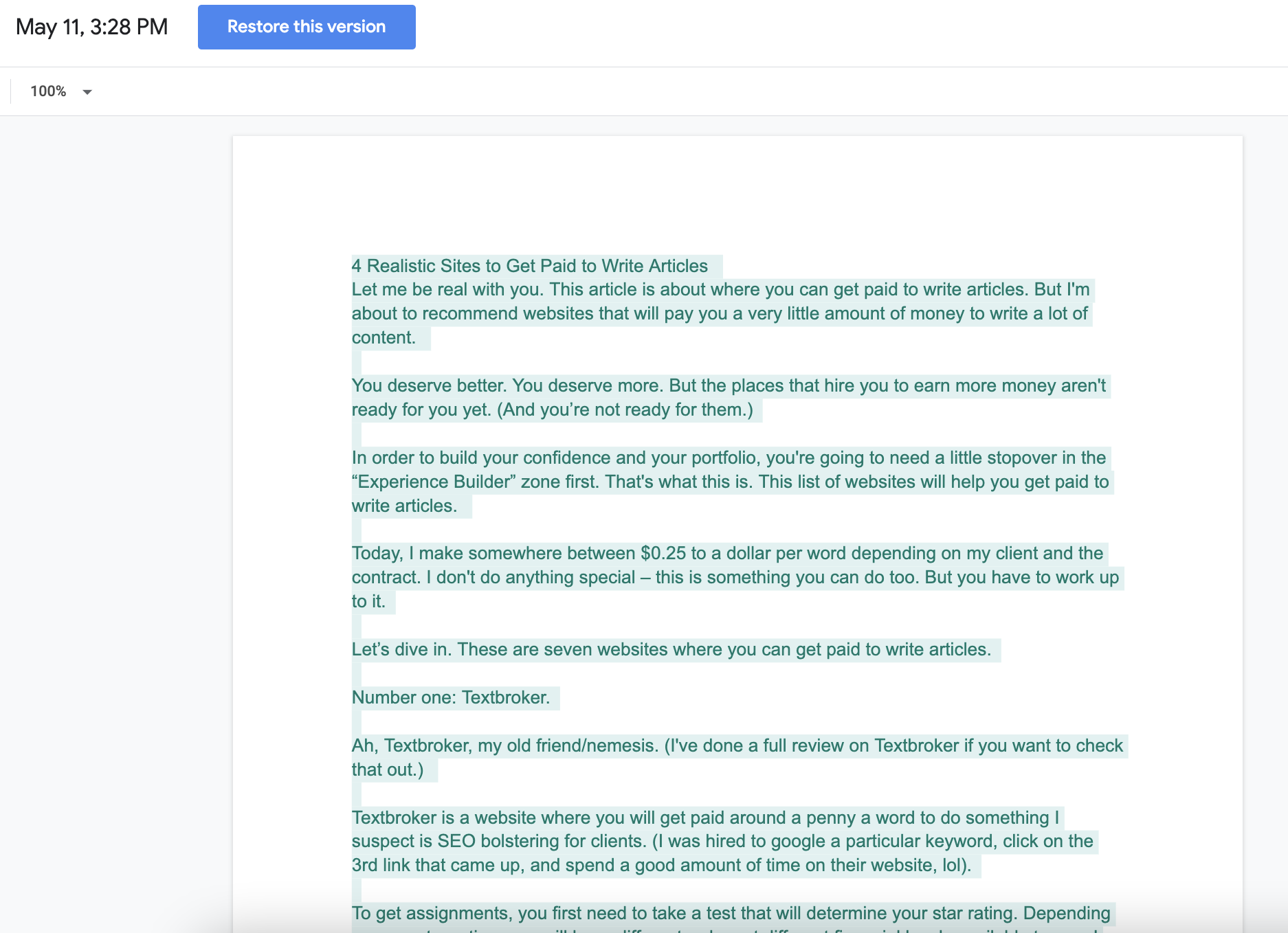How to Write a Blog Post in One Hour
Get tips, checklists, and tutorials here.
Let’s talk about speed. (The ability to write a blog post in one hour. Not the drug. Obviously.)
Normally, I'm not a huge proponent of speed. I think think it's normally better to take your time and craft something that you're proud of. However, in today's attention economy, it's always a good idea to know how to crank out an article in less than an hour when you need to. There will be times for you to write long, detailed, highly researched think pieces and personal essays. There will also be times when it’s 8 pm on a Friday, you need to publish a blog post this week, and you’re exhausted. That’s when it’s very useful to know how to write a blog post in one hour.
There are four main elements to writing a blog post in less than one hour, and we're going to talk through each of them.
The first one is brainstorming, or coming up with the idea.
The next is the outline, structuring the idea, and knowing what your idea is going to look like.
The third is drafting, so typing it all out.
And the fourth is editing, polishing it, and making it fit to publish.
Let's break it all down.
(If you prefer to watch, you can catch the video right here.)
1. Brainstorming
If you want to write a blog post in one hour, you need three elements when you brainstorm ideas.
Number one, emotions. Do you care about this thing? Make sure that when you dig down and you think about how you feel about it, doesn't matter if it's positive or negative, it just has to be strong. Emotion is an accelerant on the fire of your blog post writing speed.
Number two, do you have some general knowledge about it? A blog post should always be well researched. You should never sacrifice quality. But to do that fast, you should pick a subject where you know a little bit about the area. Maybe you already have some key facts memorized, or failing that, you know where you can find them pretty easily. You're not going to have to spend a lot of time searching for screenshots or looking for hyperlinks. You're familiar with the terrain.
And number three, it has to be at least something you suspect other people will care about. When you are trying to write a blog post in one hour, one of the key motivators for speed is knowing that there's another person at the end of the line. Somebody else is going to have this in front of their eyeballs and they're going to care about it just like you do.
An example of how I brainstormed an idea: I recently went to this very small town in Spain called Estepona. I wanted to write about it. I felt very passionately about it. I love this town. I knew a lot about it because it's just been. And the way that I made it palatable to general audiences was I titled it “6 Underrated Reasons to Visit Estepona, Spain.” The idea of them reading that made me excited to write it, which was a fantastic motivation to write that blog post in an hour.
2. Outlining
When you want to write a blog post in one hour, the fastest way to do it is to have a structure in mind before you begin. There are four or five outlines that I cycle through regularly. Here’s a very simple blog post structure. I sell a more complex one here.
A classic outline example is a listicle, like “Ten Things You Didn’t Know About Peperomia Plants.” Another easy-to-write outline is a tutorial, known as a How-To. Especially if it's something that you're knowledgeable about, you can bang through those steps quickly.
Where there's a given structure, you already know how you're going to tackle it. Those help outline so quickly. If you're looking to write a blog post in an hour, I would try to fit your idea into an outline structure that you already have in mind, rather than trying to write a think piece or a personal essay. Those take a lot longer to write. They're not the kind of thing that you can crank out in an hour.
I want to show you a very rough outline that I drafted just to give you an idea of the kind of thing you're looking for. This is a listicle. As you can see, I've gone for four sites for beginners to make money writing. (I’ve linked the full article if you’re interested!)
In the brainstorming phase, I came up with this idea because it's something I feel passionate about. I think beginners should get paid to write, no matter how beginning they are. And I don't think that there are enough resources out there to help these people get paid. It's something I'm knowledgeable about. I've used all four of these websites. I know them inside and out, and it's something that I suspect other people care about that made it a great idea to start outlining.
When I went to the outline, I easily slotted it into a listicle format. I probably could have done a how-to, or a PSS (the earlier outline structure I mentioned) if I wanted to, but I don't have to. It lends itself to the list of this works great.
This outline took me maybe five or ten minutes to put together. It took me maybe five minutes to come up with this idea. So up till now, it's taking me somewhere between ten and 15 minutes to get to this point where we have this piece of content before us.
Remember, the more time you spend on your outline, the easier it’s going to be to write a blog post in one hour.
3. Drafting.
Once I had my outline above, I was able to quickly draft that out in about 25 minutes to write about 1,200 words. (I have the timestamps to prove it!)
I'm going to tell you a secret though. I didn't type this. I'm not a super fast typer because I have terrible typing posture. (I use two fingers on my left hand and three on my right. My pinkies stick up like I’m having tea with the Queen. No, I’m not ashamed.)
Instead, I used voice to text. Google Docs has this awesome voice typing tool. It’s not perfect - it often has typos, but not so many that it takes me more time to fix the typos than it would take to write the blog post in one hour without typos. It lets me reach lightning-fast speeds of 48 words per minute, resulting in a draft in 25 minutes and that's pretty amazing.
Before we move onto stage four of editing, let's recap. At this point, I have spent 40 minutes coming up with an idea, outlining it, and drafting it. Do I publish this? No, I don't. I spend the final 20 minutes of my hour editing the heck out of this.
4. Editing
Editing is so important. Editing is going to be what takes your piece from good to great when you're drafting. It's so important to just push the words out, especially if you’re in a time crunch.
Personally, I can spend ten or 15 minutes just trying to come up with the perfect next sentence. It's much faster for me – and you, I suspect! –to write a crappy sentence and spend two minutes later coming back and punch it up by removing a word or by adding a word. So write crap. Edit it into good stuff later.
I use this editing checklist:
Grammarly. I run everything through Grammarly, especially if I've used voice to text. There's always something I've missed. Grammarly has a bunch of different suggestions that I can take to make this at least readable at a basic level.
Read it out loud. This is boring. Everyone hates to hear this, but you need to do it. Read the whole thing out loud. Start to finish. Read it the way you want a reader to experience it, with emotion, inflection, tone, and pauses. Get excited. Share that passion. This will tell you how your piece flows and it's going to catch the typos that Grammarly didn't catch.
Ask what’s missing, or what is too much. I look for what is a potential reader going to ask me that isn't covered here. Then I go through each sentence and see if I can take it out. Often, I delete my whole introduction because I just wrote it to get the juices flowing but it doesn't contribute that much to my article at all.
Then you're done with the editing and you have a gorgeous article that is ready to submit anywhere you want. You can put it on Medium; you can put it on your website. You can repeat this process as often as you need to write blog posts in less than an hour.
5 tips to get faster at writing blog posts
I want to end with a couple of ways to improve your speed. Writing quickly is a skill that you need to develop. These are a couple of things you can do to increase your speed no matter where you are in your journey.
Time yourself. You can't improve if you don't know where you're starting. Next time you write a blog post before you even come up with the idea, start a timer. See how long it takes you from start to finish. From coming up with an idea to submitting it, how long that process takes, and how long does each part of that process take? If it's taking you an hour to come up with an idea, that's a great place to look for improvements. If it's taking you three hours to edit, maybe look for ways to speed that up. But first, you have to know where you're starting from. Timing is everything.
Make yourself wait to write. This is a counterintuitive one, but if you want to write a blog post in an hour, I find it helps to let an idea percolate in your mind a little bit before you unleash your fingers and write what you want to write. When you sit down to write, your brain has actually done a lot of the hard work already and you're ready to go more than you would have been if you started a week ago.
Outlines. The more you can think in structures and bullet points, the faster you're going to get at outlining and then turning that outline into a draft. Get familiar with the outlines I’ve laid out in this article, and see if you can spot outline types in other articles you enjoy!
Practice touch typing. This is where I fall short, but it's one of the fastest ways to improve
Get concise. Get better at conveying your idea in fewer words.
Those are five strategies you can use to speed up your writing, no matter where you are in the process.
Hopefully this article helped you figure out how to write a blog post in one hour! Let me know how you get on in the comments. Like I said, I don’t suggest doing this for every article, but it’s always worth knowing how to do this when you need to.



